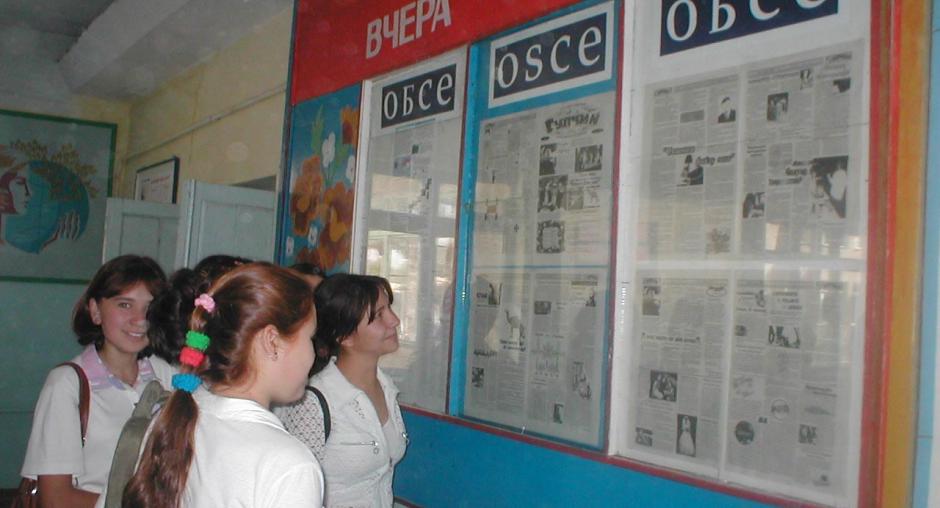Newsroom
OSCE workshop gives Tajik journalists tools to fight corruption
DUSHANBE 23 October 2003

(OSCE)To help Tajikistan's remote regions to gain better access to information, the OSCE Centre in Dushanbe has enabled 115 schools to subscribe to a local newspaper. (OSCE) Photo details
DUSHANBE, 23 October 2003 - More than 40 journalists from all regions of Tajikistan discussed practical and legal aspects of reporting on corruption at the first workshop held in the country devoted to the issue.
The two-day workshop, ending today, was jointly organized by the OSCE Centre in Dushanbe and the non-governmental organization Transparency International (TI).
According to TI Corruption Perceptions Index, Tajikistan scores 1.8 out of 10, which corresponds to a very high level of perceived corruption.
"Free and non-partisan media is a vital part of a corruption-free society," said Jeff Lovitt, Head of Transparency International's Public Relations. "Those countries of the world that have the biggest level of transparency and media freedom are in general the least corrupted ones.
"If the media does not implement its watchdog role towards the authorities, it can hardly be called a watchdog anymore."
Rahmatullo Zoirov, a lawyer from Dushanbe analyzed the Tajik laws dealing with access to information, libel and media.
Participants in the pilot event, which aimed to engage journalists in anti-corruption work, also discussed corruption problem within the media.
A translation of the TI corruption sourcebook was delivered to the participating journalists.
The OSCE Centre in Dushanbe provides modest small grants to media outlets which cover corruption issues.
The two-day workshop, ending today, was jointly organized by the OSCE Centre in Dushanbe and the non-governmental organization Transparency International (TI).
According to TI Corruption Perceptions Index, Tajikistan scores 1.8 out of 10, which corresponds to a very high level of perceived corruption.
"Free and non-partisan media is a vital part of a corruption-free society," said Jeff Lovitt, Head of Transparency International's Public Relations. "Those countries of the world that have the biggest level of transparency and media freedom are in general the least corrupted ones.
"If the media does not implement its watchdog role towards the authorities, it can hardly be called a watchdog anymore."
Rahmatullo Zoirov, a lawyer from Dushanbe analyzed the Tajik laws dealing with access to information, libel and media.
Participants in the pilot event, which aimed to engage journalists in anti-corruption work, also discussed corruption problem within the media.
A translation of the TI corruption sourcebook was delivered to the participating journalists.
The OSCE Centre in Dushanbe provides modest small grants to media outlets which cover corruption issues.
